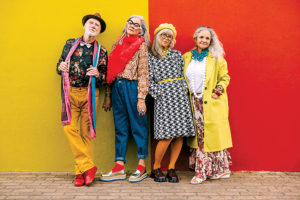
By Bob Roth
After dining at a restaurant recently, I was nearly giddy with excitement. I called my dad, immediately sharing my enthusiasm for the food, the abundant outdoor space and especially the service. Days later, when my dad reported back that he had essentially been ignored at the same restaurant, I felt saddened that the disrespect my dad had experienced was likely due to ageism. Ageism occurs when people face stereotypes, prejudice or discrimination because of their age.
My 86-year-old, still past six-feet-tall, larger-than-life dad was most likely a victim of discrimination based on the stereotype that older adults are unpleasant and difficult to deal with. Dad probably asked the waiter several times to repeat himself because hearing aids are notorious for amplifying background noise. Perhaps that set the tone for the evening.
This is all conjecture, but one thing is for certain. If we are lucky, we will have the privilege to grow older. Clearly, we all want to be 86 and dining around town. I believe if we examine how we all contribute in small ways to the negative stereotypes, we can slowly start a cultural shift and elevate the status of our older adults.
Actor Jamie Lee Curtis has a refreshing take on getting older by asking people to shift their attitudes on the loss of youth. Curtis stated recently in an interview, “This word ‘anti-aging’ has to be struck. I am pro-aging. I want to age with intelligence, grace, dignity, verve and energy.” This is beautifully stated and is equally inspirational and aspirational.
Take a stroll down the greeting card aisle and you will see that older than 30 is over the hill. We perpetuate this self-loathing by sending these cards. Why don’t we repeat out loud more often, “If I knew then what I know now,” emphasizing the maturity and sense of self that we have developed through our life experiences.
The societal shift starts with individuals and families learning together on a micro-level. Explain to our children and grandchildren how the elders in societies around the world are revered for their knowledge.
Many older adults feed into the negativity by using humor as a crutch or defense. We made a birthday video for my dad 30 years ago and the sound bite that stuck was advice from a slightly older friend, “The worst thing about getting old is that just about everything hurts and… if it doesn’t hurt, it doesn’t work.”
As a family, we have quoted and laughed about that line for years. There are instances when humor can be a great tool to de-escalate stressful situations, yet repetitive use of negative stereotypes is detrimental. Do our words, attitudes and behaviors paint older adults as weak, feeble, asexual or forgetful? Even in the context of a joke, these subliminal sentiments contribute to the prevalence of ageism.
Upon thoughtful introspection, I don’t want to send that message to my children and future grandchildren. Birthday message reboot should go something like this, “When your feet hurt and appear misshapen, think about those glorious hikes and peaceful morning dog walks and that now you are much wiser because you realize the importance of great fitting shoes.”
Bob Roth is the managing partner of Cypress HomeCare Solutions.







